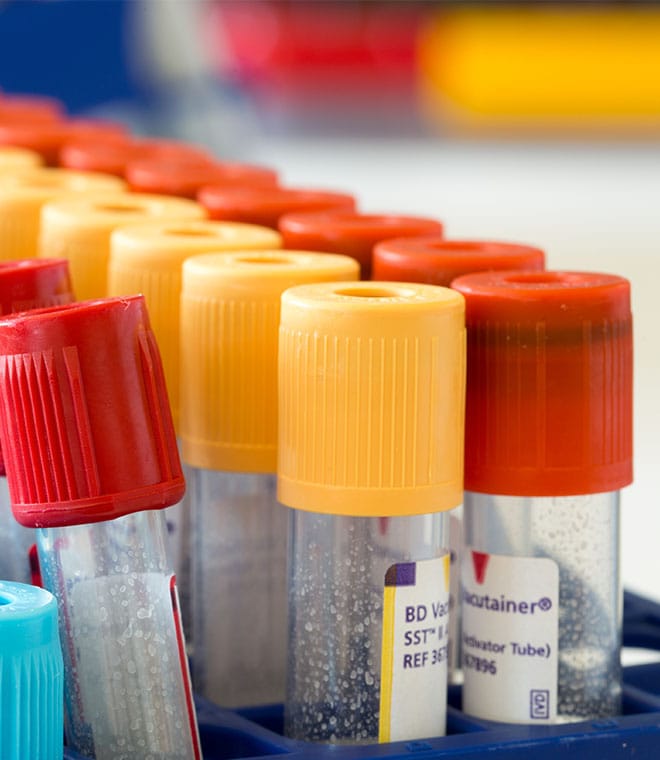Health
What is lipid panel testing?
By Keyur Mavani, MD, Fellow of the American College of Cardiology, FACP Jul 25, 2023 • 5 min
Blood tests are an important tool used to screen for a variety of health conditions. The lipid panel is one of the most commonly performed blood tests, and it can provide valuable health information.
What is a lipid panel?
A lipid panel is a blood test that measures the amounts of certain lipids in your blood. Your healthcare provider may order a fasting lipid panel, which requires you to go without eating or drinking anything besides water for 10 to 12 hours before the test. The other option is a nonfasting lipid panel that doesn’t involve abstaining from food and drink.
Lipids are fatty compounds that serve a variety of roles in the body. While they are important for your health and well-being, abnormal levels of some lipids can clog arteries and increase your risk for heart disease, heart attack and stroke.
What does a lipid panel test for?
There are five tests typically included in a lipid panel:
- Low-density lipoprotein (LDL) cholesterol: Sometimes called “bad cholesterol,” this form of cholesterol is the type that can build up in blood vessels.
- Very low-density lipoprotein (VLDL) cholesterol: This type of cholesterol typically comes from the food you’ve eaten. On a fasting lipid panel, elevated levels of VLDL can indicate that your body metabolizes lipids improperly.
- High-density lipoprotein (HDL) cholesterol: Commonly called “good cholesterol,” this lipid helps remove LDL from blood vessels. Low HDL levels increase the risk of heart disease.
- Triglycerides: These lipids are fats that come from foods you eat. They’re stored in your cells to provide a source of energy. High levels of triglycerides put you at a greater risk for developing heart disease.
- Total cholesterol: This test measures the total amount of LDL, VLDL and HDL cholesterol in your blood.
Why do healthcare providers order lipid panel testing?
In some cases, healthcare providers order lipid panel testing as part of a routine checkup to screen for high cholesterol and triglycerides, especially for people who have risk factors for heart disease, such as:
- Men 45 and older
- Women 50 and older
- Individuals with a past history of abnormal results on a lipid panel test
- Smokers
- Individuals who are overweight or obese
- People who lead a sedentary lifestyle
- Those with a parent or sibling who had heart disease at an early age
- Individuals with high blood pressure, diabetes or prediabetes
- People with a history of stroke or TIA (transient ischemic attack)
- Those with a history of coronary artery disease
- Those with a history of peripheral artery disease
People who have already been diagnosed with high cholesterol and/or triglycerides may undergo lipid panel testing regularly to assess how well their treatment plan is working. Less commonly, healthcare providers may order lipid panel tests to diagnose liver disease, pancreatitis, kidney disease and hypothyroidism.
What is the normal range for a lipid panel?
Lipid panel tests typically present cholesterol and triglyceride levels in milligrams per deciliter of blood, or mg/dL. Here are the normal ranges for each lipid:
- LDL cholesterol: Below 100 mg/dL, or below 70 mg/dL if you have diabetes or a history of stroke, peripheral vascular disease or coronary artery disease
- VLDL cholesterol: Between 2 and 30 mg/dL
- HDL cholesterol: Above 60 mg/dL
- Triglycerides: Below 150 mg/dL, especially with any vascular disease
- Total cholesterol: Below 200 mg/dL
What happens if I receive abnormal results?
Depending on the results of your lipid panel test, your healthcare provider may classify you as a borderline, intermediate or high risk for cardiovascular disease. Then, they will work with you to develop a treatment plan to lower your risk as much as possible.
Treatments for high cholesterol and/or triglycerides often include prescription medications and lifestyle changes, such as dietary modifications and getting more exercise. Your healthcare provider may recommend treatments based on the results of your test, your age, your health history, what medications you currently take and any other risk factors for heart disease you may have.
Updated July 2023.
Sources:
- https://familydoctor.org/blood-test-lipid-panel/
- https://my.clevelandclinic.org/health/diagnostics/17176-lipid-panel
- https://www.hopkinsmedicine.org/health/treatment-tests-and-therapies/lipid-panel
- https://www.mountsinai.org/health-library/tests/vldl-test
- https://www.mayoclinic.org/diseases-conditions/high-blood-cholesterol/in-depth/triglycerides/art-20048186



